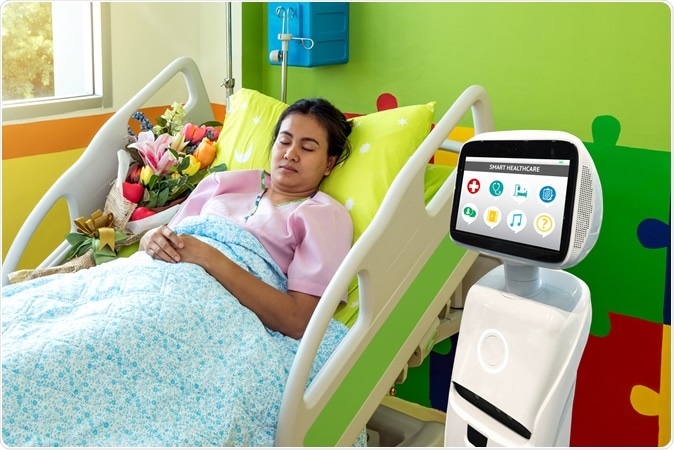Soon the complaints about the short time doctors spend with their patients may be a thing of the past. Robots, artificial speakers (smart speakers like Siri or Alexa) and Artificial Intelligence (AI) could help lend an ear to patient complaints says a report from the NHS.

Conceptual robotic advisor in healthcare. Image Credit: Zapp2Photo / Shutterstock
Released this week, the report on the technological “revolution” in healthcare, also spoke about the genetic database including up to 5 million genome individual gene sequencing and its contribution to healthcare.
The report was led by Eric Jeffrey Topol, an American cardiologist, geneticist, and digital medicine researcher.. It urges development and training of the staff and said that 90 percent of the NHS jobs within 20 years would require digital skills. The report assures critics that instead of robots taking over humans, they would help “enhance” the professional commitments of the doctors and help them spend more time with patients.
- Topol's report speaks about smart speakers that can have a major role to play in health care. The report says that these speakers might be “valuable tools” that could help update patient records and reduce paperwork for doctors.
- According to studies, these digital tools could help save an average of 5.7 hours of the GP’s time across England in a year.
- The report says they could use the “mental health triage bot” which could record and detect suicidal ideation from the tones of the conversation.
- Other uses for virtual reality include reduction in symptoms of PTSD (post-traumatic stress disorder), anxiety disorders, phobias etc.
- AI has been shown to be effective in interpreting scans and reports as well as pathology slides to improve diagnosis.
- Authors of the report emphasize upon the usefulness of robotic surgery and the precision it could provide.
- The report adds that time and money could be saved by using phones or Skype for diagnoses and treatment and automated tasks like dispensing could be taken over by robotics.
- Gene databases could provide data on disease and diagnosis as well as tailor made therapeutics
- Gene editing could also soon be an essential tool in treating genetic diseases says the report.
The review says that the next step would be making the staff digitally literate so as to implement these technological advances. The report adds that there are limitations to use of technology and AI. Communication with AI could for example be felt “manipulative or deceptive” and this means that patients need to know beforehand if they are interacting with a human or a machine.
Benefits outweigh the risks feel experts. Topol said that this advancement has the potential to “greatly strengthen patient-doctor relationships” and “reduce the burnout we can see in a significant proportion of clinicians today”. The health secretary, Matt Hancock, said in a statement, “Our health service is on the cusp of a technology revolution and our brilliant staff will be in the driving seat when it happens. Technology must be there to enhance and support clinicians. It has the potential to make working lives easier for dedicated NHS staff and free them up to use their medical expertise and do what they do best: care for patients.”
The authors conclude, “Our review of the evidence leads us to suggest that these technologies will not replace healthcare professionals, but will enhance them … giving them more time to care for patients.”
Source:
https://topol.hee.nhs.uk/